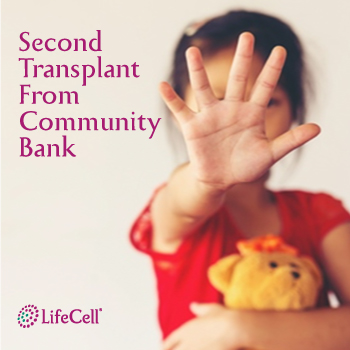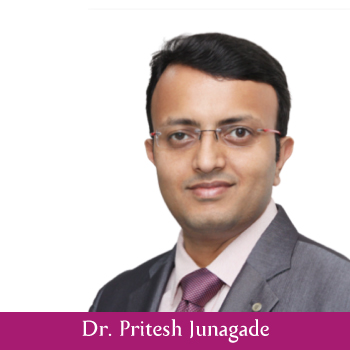Usted está aquí
‘Thank You LifeCell & Community Cord Blood Banking!’ said Little Gauri’s Parents
 Gauri (name changed) was diagnosed with Beta-Thalassemia Major seven years ago. Thalassemia is a hereditary disorder which causes the body to make abnormal hemoglobin, the component of red blood cells that enables them to carry oxygen. Throughout Asia, it is common for people to carry one of the Thalassemia mutations, and in India there are more than ten thousand births per year of children that carry the severe form called “Thalassemia Major”1. Not only do Thalassemia Major patients feel fatigued from chronic anemia, but their frequent blood transfusions lead to organ damage and ultimately shortened lifespans. The only cure for Thalassemia Major is a stem cell transplant with bone marrow or cord blood from a healthy donor.
Gauri (name changed) was diagnosed with Beta-Thalassemia Major seven years ago. Thalassemia is a hereditary disorder which causes the body to make abnormal hemoglobin, the component of red blood cells that enables them to carry oxygen. Throughout Asia, it is common for people to carry one of the Thalassemia mutations, and in India there are more than ten thousand births per year of children that carry the severe form called “Thalassemia Major”1. Not only do Thalassemia Major patients feel fatigued from chronic anemia, but their frequent blood transfusions lead to organ damage and ultimately shortened lifespans. The only cure for Thalassemia Major is a stem cell transplant with bone marrow or cord blood from a healthy donor.
Gauri’s doctors hoped for her to have a normal life by undergoing a stem cell transplant. Unfortunately, like 70% of Indians, Gauri did not have a matching donor within her immediate family2. Her parents waited for the birth of a sibling in November 2020, in hopes that the baby could give Gauri a cord blood transplant. But as luck would have had it, her new sibling was not a close enough match to be her donor. This news devastated Gauri’s parents!
Gauri had to look beyond her family for a fallback donor. In the absence of a suitable family donor of stem cells, the standard fallback strategy is to search international registries for a matched unrelated donor3. This is challenging for Indians. Although there are large registries of cord blood units and bone marrow donors in other countries, they have a less than 10% probability of matching the genetic background of Indians2, and the costs to procure a single stem cell unit from overseas are very high (~USD 43,500)1,4. Cord blood does not have to be as precisely matched as bone marrow, but sadly, India currently does not have any active public banks of cord blood donors4,5.
That’s where LifeCell stepped in. Luckily, upon advice from their doctor, Gauri’s parents had stored the cord blood of her younger sibling under the LifeCell Community Banking program. Community Banking is a new type of cord blood bank that was invented by LifeCell. In a Community Bank, all the client families pay to store their child’s cord blood, but then the member families share access to the inventory with each other. In this way, the community of banked units provides donors to children and their immediate relatives that don’t have a family donor. The business model of community banks was described in a previous newsletter from this Foundation6.
 Gauri was able to find a high quality 90% HLA matched cord blood donor unit through LifeCell’s Community Bank. In order to be effective, a community bank needs to be big. Researchers have predicted that it takes 50,000 cord blood units to achieve a match for 97% of the Indian population2. LifeCell is the only cord blood bank in India that has a Community Bank this large, in fact LifeCell has over 60,000 cord blood units that are consented and qualified for Community Banking.
Gauri was able to find a high quality 90% HLA matched cord blood donor unit through LifeCell’s Community Bank. In order to be effective, a community bank needs to be big. Researchers have predicted that it takes 50,000 cord blood units to achieve a match for 97% of the Indian population2. LifeCell is the only cord blood bank in India that has a Community Bank this large, in fact LifeCell has over 60,000 cord blood units that are consented and qualified for Community Banking.
Gauri successfully underwent her unrelated cord blood transplant in May 2022. She was treated by Dr. Pritesh Junagade at Lotus Hospital in Nashik, Maharashtra. Importantly, her parents were able to request and immediately withdraw her matched sample from the Community Bank at no additional expense, which otherwise would cost more than INR 30 lakhs (~USD 43,500)1 for a single cord blood unit from an international public bank. When parents pay to join a community bank, they are also joining a financial assistance program which provides coverage for transplant-related medical expenses. Gauri’s treatment marked LifeCell’s 2nd cord blood transplantation that was facilitated exclusively under the Community Banking program.
Gauri has a new lease on life thanks to the timely intervention of LifeCell to support her family in their time of need. LifeCell, India’s largest cord blood bank, turns 18 years old in November 2022, coinciding with the celebration of World Cord Blood Day 2022.
Innovations that set LifeCell apart:
 StemMatch: The Ultimate Matchmaker. StemMatch will identify how many matches a member has available in the LifeCell Community Bank, at the levels of complete (100%), partial (90%), or acceptable (75%) HLA match. Results are available within 15 days and updated annually. This provides individuals with peace of mind and assurance, helping them to prepare for an uncertain future. Know more >>
StemMatch: The Ultimate Matchmaker. StemMatch will identify how many matches a member has available in the LifeCell Community Bank, at the levels of complete (100%), partial (90%), or acceptable (75%) HLA match. Results are available within 15 days and updated annually. This provides individuals with peace of mind and assurance, helping them to prepare for an uncertain future. Know more >> Family Floater: Extending Community Banking Life-Saving Benefits to Additional Family. Members of LifeCell’s Community Bank automatically have coverage for their baby that banked cord blood, the baby’s siblings, the parents of the baby, and the grandparents of the baby. With the additional Family Floater service, the coverage of benefits can be extended to the baby’s aunts and uncles and first cousins. Know more >>
Family Floater: Extending Community Banking Life-Saving Benefits to Additional Family. Members of LifeCell’s Community Bank automatically have coverage for their baby that banked cord blood, the baby’s siblings, the parents of the baby, and the grandparents of the baby. With the additional Family Floater service, the coverage of benefits can be extended to the baby’s aunts and uncles and first cousins. Know more >> LifeCell’s Guaranteed Mesenchymal Stem Cells (MSC’s) Program: In contrast to practices in other countries, in India, the Drugs Controller General India (DCGI) only licenses banks to store stem cells from umbilical cord blood, but not from birth tissues of the umbilical cord and placenta. Thus, it is impossible in India to use personally stored cord tissue for therapy with mesenchymal stem cells (MSCs). However, MSC therapies can be obtained in India through biopharma companies that have prepared off-the-shelf cell samples from donors. LifeCell is one such company that is licensed to prepare MSC therapies from healthy donated cord tissue, and they are available automatically to LifeCell clients as part of the Community Bank. Upon application for an approved diagnosis, LifeCell will provide such regulatory approved and guaranteed 1 billion MSCs within 7 days along with INR 20 lakhs financial assistance to offset the treatment related expenses for the baby, its siblings and parents for the initial 21 years of the contract. Know more >>
LifeCell’s Guaranteed Mesenchymal Stem Cells (MSC’s) Program: In contrast to practices in other countries, in India, the Drugs Controller General India (DCGI) only licenses banks to store stem cells from umbilical cord blood, but not from birth tissues of the umbilical cord and placenta. Thus, it is impossible in India to use personally stored cord tissue for therapy with mesenchymal stem cells (MSCs). However, MSC therapies can be obtained in India through biopharma companies that have prepared off-the-shelf cell samples from donors. LifeCell is one such company that is licensed to prepare MSC therapies from healthy donated cord tissue, and they are available automatically to LifeCell clients as part of the Community Bank. Upon application for an approved diagnosis, LifeCell will provide such regulatory approved and guaranteed 1 billion MSCs within 7 days along with INR 20 lakhs financial assistance to offset the treatment related expenses for the baby, its siblings and parents for the initial 21 years of the contract. Know more >> LifeCell’s Mesocel: A potential game-changer in the fight against COVID-19. LifeCell’s Mesocel is an advanced cell therapy product consisting of over 100 million expanded mesenchymal stem cells (MSCs) derived from donated umbilical cord tissue. LifeCell has received approval from the Drug Controller General of India (DCGI) to conduct a human clinical trial evaluating the safety and efficacy of Mesocel for the treatment of severe COVID-19 patients. Know more >>
LifeCell’s Mesocel: A potential game-changer in the fight against COVID-19. LifeCell’s Mesocel is an advanced cell therapy product consisting of over 100 million expanded mesenchymal stem cells (MSCs) derived from donated umbilical cord tissue. LifeCell has received approval from the Drug Controller General of India (DCGI) to conduct a human clinical trial evaluating the safety and efficacy of Mesocel for the treatment of severe COVID-19 patients. Know more >> Allografts: Wound care from the womb! LifeCell’s AmchoPlast® and AmnioPlast® are among India’s first advanced wound care products that are derived from donated human amniotic tissue. These products harness the natural healing properties of amniotic membrane to accelerate tissue regeneration. For clients who voluntarily donate their baby’s birth tissues to LifeCell, they offer two free allografts for the baby, its siblings and parents for the initial 21 years of the contract. Know more >>
Allografts: Wound care from the womb! LifeCell’s AmchoPlast® and AmnioPlast® are among India’s first advanced wound care products that are derived from donated human amniotic tissue. These products harness the natural healing properties of amniotic membrane to accelerate tissue regeneration. For clients who voluntarily donate their baby’s birth tissues to LifeCell, they offer two free allografts for the baby, its siblings and parents for the initial 21 years of the contract. Know more >> GenomeScope Newborn: Baby’s genomic horoscope! GenomeScope Newborn is an advanced genetic test that identifies the variations in DNA causing infants to be born with or develop severe genetic conditions. Using the advanced NGS (Next Generation Sequencing) technology, the test analyzes 4000+ genes and 1500+ genetic disorder markers to generate reports which have a detection rate of >95% and reporting accuracy of >99%. Know more >>
GenomeScope Newborn: Baby’s genomic horoscope! GenomeScope Newborn is an advanced genetic test that identifies the variations in DNA causing infants to be born with or develop severe genetic conditions. Using the advanced NGS (Next Generation Sequencing) technology, the test analyzes 4000+ genes and 1500+ genetic disorder markers to generate reports which have a detection rate of >95% and reporting accuracy of >99%. Know more >> Live Tracking of Stored Samples : Cryopreservation No More A Black Box! Today, LifeCell’s clients can log into their online portal to view real-time monthly temperature data that is automatically recorded inside the cryo-chambers in which their baby’s cord blood stem cells are being stored. This clearly assures the client that their baby’s precious cord blood stem cells continue to be stored safely. Know more>>
Live Tracking of Stored Samples : Cryopreservation No More A Black Box! Today, LifeCell’s clients can log into their online portal to view real-time monthly temperature data that is automatically recorded inside the cryo-chambers in which their baby’s cord blood stem cells are being stored. This clearly assures the client that their baby’s precious cord blood stem cells continue to be stored safely. Know more>> Safe Transplantation Program: Enabling safer and successful cord blood transplantations! LifeCell is the first and only cord blood bank in the world to automatically perform NGS genomic profiling on cord blood stem cell units before they are released for transplant. The test results provide assurance to the doctors and family of patients that the cord blood unit does not carry any risk of inherited diseases. Know more>>
Safe Transplantation Program: Enabling safer and successful cord blood transplantations! LifeCell is the first and only cord blood bank in the world to automatically perform NGS genomic profiling on cord blood stem cell units before they are released for transplant. The test results provide assurance to the doctors and family of patients that the cord blood unit does not carry any risk of inherited diseases. Know more>> Premium Sample Collection Kit Box. All clients of LifeCell benefit from our premium and advanced stainless steel sample collection kit. The LifeCell kit follows optimum standards of cold chain delivery to maintain quality and integrity of the sample that is transported. LifeCell protects your baby’s stem cells against fluctuations in external temperature and other damages. Know more >>
Premium Sample Collection Kit Box. All clients of LifeCell benefit from our premium and advanced stainless steel sample collection kit. The LifeCell kit follows optimum standards of cold chain delivery to maintain quality and integrity of the sample that is transported. LifeCell protects your baby’s stem cells against fluctuations in external temperature and other damages. Know more >> Continued Protection Against Rejection: Because every baby & family deserves a second chance! In rare circumstances, if the baby’s cord blood is not suitable for storage in the Community Bank, LifeCell offers the parents a second option to continue their contract so they can enjoy the protections and benefits of the Community Bank program. This ensures the hopes of such families stay intact compared to termination of contracts that occur at other cord blood banking facilities. Know more>>
Continued Protection Against Rejection: Because every baby & family deserves a second chance! In rare circumstances, if the baby’s cord blood is not suitable for storage in the Community Bank, LifeCell offers the parents a second option to continue their contract so they can enjoy the protections and benefits of the Community Bank program. This ensures the hopes of such families stay intact compared to termination of contracts that occur at other cord blood banking facilities. Know more>>
References
- Colah RB, Seth T. Thalassemia in India. Hemoglobin 2022; 46(1):20-26.
- Maiers M, Halagan M, Joshi S, ... Weisdorf, D. HLA match likelihoods for Indian patients seeking unrelated donor transplantation grafts: a population-based study. The Lancet 2014; 1(2):E57-E63.
- Indian Council of Medical Research (ICMR). National Guidelines for Hematopoietic Cell Transplantation. Published January 2021
- Kindwall‐Keller TL, Ballen KK. Umbilical cord blood: The promise and the uncertainty. Stem Cells Transl Med. 2020; 9(10):1153–1162.
- Jeevan Public Cord Blood Bank
- Verter F, Mandot V. Public Banking Without Bankrupting. Parent’s Guide to Cord Blood Foundation Newsletter Published July 2019


